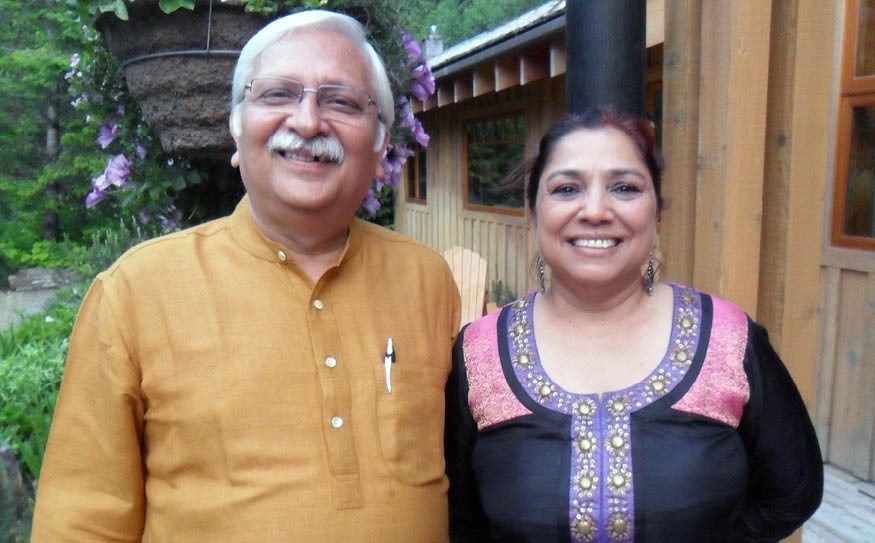In their home city of New Delhi, India, it is 45 degrees Celsius at this time of year, so UNESCO co-chairman Dr. Rajesh Tandon and his wife Martha Farrell are enjoying the mild overcast Saturday evening at the Brew Creek Centre, south of Whistler.
Wanting the full Sea to Sky experience, they are also looking for bears. While the weather is a temperate delight, the bears prove elusive for the visitors.
During a 10-day visit to Canada, Tandon and Farrell came to the centre on June 8 to talk about community engagement in marginalized communities in India and their experiences running the Society for Participatory Research in Asia (PRIA).
It is Tandon's three decades running the NGO alongside his wife which led to his being appointed to the UNESCO position in 2012.
Years before, as a student in Rajasthan, he saw that the deep experiences and knowledge of the poor were not used or valued.
"In a hierarchical, stratified society, change does not only happen from the top," Tandon told the 25 people who gathered to share dinner with him and hear him speak.
His talk was part of a series set up at Brew Creek in June by John McCormick, the former director of development at the Dalai Lama Center for Peace and Education, who has long ties to Whistler.
Both Tandon and Farrell outlined the broad aims of their work in a 60-minute presentation.
Said Tandon: "Unless people get involved in organizing themselves, in organizing their community, and in mobilizing their own resources to bring about change (nothing will happen) — depending on governments or distant providers for services does not bring about change. The change requires working from the bottom of the pyramid directly."
PRIA concentrates on three areas of urgency in the world's largest democracy: violence against women, including sexual harassment at work and marginalization at home; democratic participation by undervalued, disenfranchised communities, including political participation at the local level; and lifelong learning to encourage community and nation building.
The scale of the challenge is unthinkable in India, with the country having 1.2 billion people, between 400 and 500 local municipalities and 450,000 village organizations. Surprisingly, local governments in India did not come into being until the early 1990s.
"We have a challenge in making democracy work for all our citizens," Tandon said.
An author and international expert in development management, he built and trained a network of thousands of volunteers in participatory monitoring and networking. The outcome is coalitions between Indian citizens, governments and other bodies, which aim to create effective change despite an atmosphere in India where "somehow public investment is not making a difference."
Some of the projects include community monitoring, setting up systems to make sure the basic services are reported on if they stop working; creating public hearings on community issues; online education; training both girls and boys in the role of gender and setting up social justice committees.
Farrell explained it could be as simple as setting up celebrations of the lives of girls, something that doesn't happen enough, she said.
It may sound like dry work that takes a long time to establish, but it changes lives and even saves them. At the core of it all is the aphorism "Knowledge is Power."
PRIA's budget is just $1.6 million per annum; their budget was over $2 million but cuts from funders like the Canadian International Development Agency (CIDA) have removed almost a million dollars per year. There are 90 staff members on the payroll who train thousands of volunteers to educate others.
Farrell outlined her work at PRIA teaching women and gender studies, citizenship and governance, looking at health issues and addressing female foeticide and violence against women.
Despite the challenges, she estimated that PRIA has trained over one million women to become more involved in local governments; India has laws at the local level whereby one-third to one-half of elected council seats must be held by women.
McCormick spent last summer in residency with PRIA while taking his master's degree in community economic development at the University of Victoria and met Tandon and Farrell there.
"I knew nothing about PRIA, never heard of it, and I went and was just blown away by the program. I can't think of a program in Canada that comes close," McCormick said.
"There were lots of people coming through the Dalai Lama Center... so (we) decided if someone was coming through Vancouver at the centre, we'd send them up to Brew Creek."
The final speaker is Victor Chan, co-founder of the Dalai Lama Center and author of a new book with the Dalai Lama called The Wisdom of Compassion, who is coming to Brew Creek on June 22.
Local entrepreneur Sue Adams, who co-hosted the evening, said meeting Tandon fed into Brew Creek's and the Whistler Forum's interest in community engagement.
"Hearing about this takes us out of our day-to-day space," Adams said. "For me, this is wonderful to come out and connect with the rest of the world."




